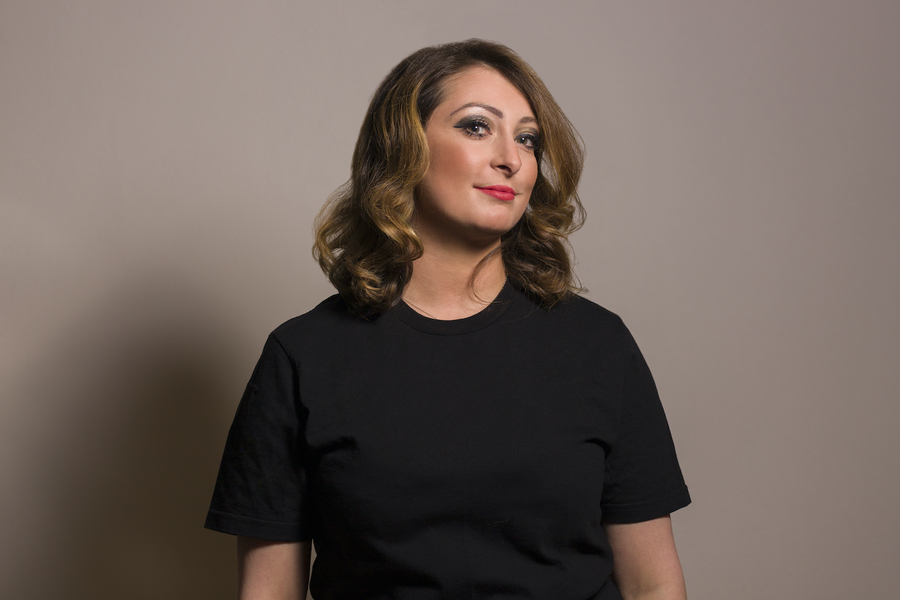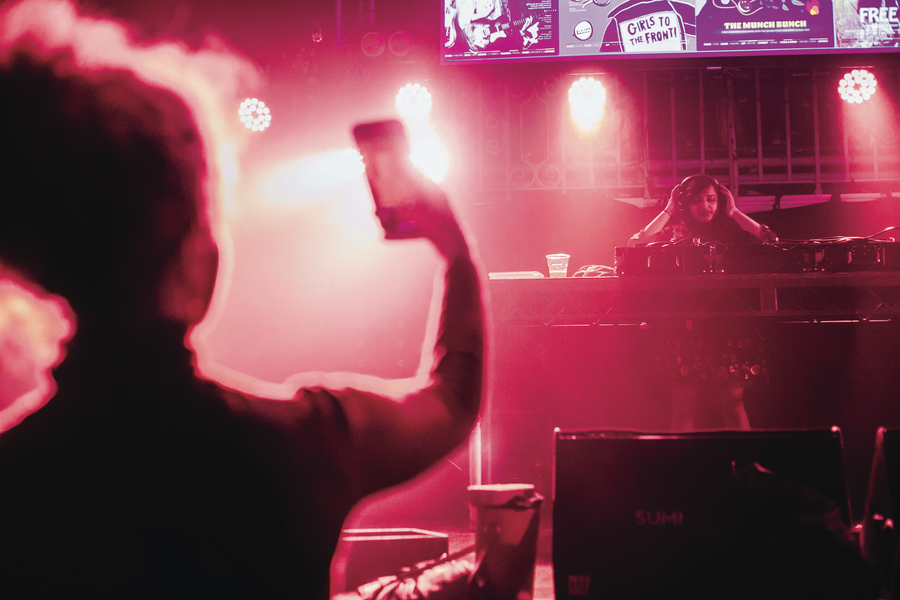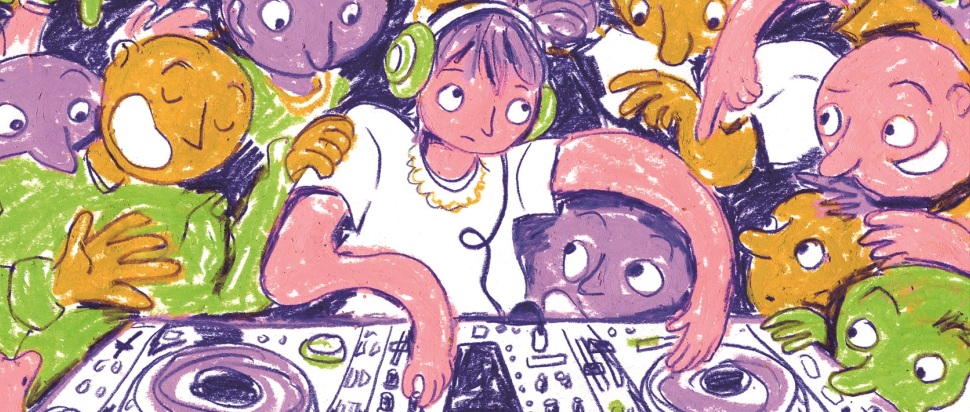Tackling Misogyny In Scottish Music
In light of the recent Misogyny in Music report, to give a snapshot of the music industry at play in Scotland, we chat to six women and nb people about their experiences navigating this so-called 'Boys’ Club'
At the end of January, the UK government’s Women and Equalities Committee, made up of 11 cross-party MPs, published their second Misogyny In Music report. Across its 70(!) pages, it calls out the music industry as a 'boys’ club' and details in great depth the limitations faced by women and non-binary people in the music industry, covering gender and race discrimination, sexual harassment and assault, unequal pay and gendered power imbalance among other things. Depressingly, none of the findings are surprising. But we’re pleased the report exists and that for once it feels like the government is trying to enact positive change to an industry that essentially gets left to its own devices.
As a woman myself working within the music industry for the better part of 20 years now, I too have come up against most of these issues. By men, I’ve been belittled, overlooked, bullied, challenged, not believed, harassed, and aggressively and terrifyingly threatened in the workplace, unable to do anything about it for fear of losing my job. I have friends who no longer work in the industry because they haven’t felt safe doing so, while the influential men who have caused such damage continue to have a seat at the table. It’s sickening, disheartening, and it's not a new story, nor is it one exclusive to the music industry. With a high percentage of the music industry made up of freelancers, protections, reporting mechanisms and legislation all fall short.
The report's aim is to rectify these shortcomings. In its summary, it states that while it is focusing on improving protections and reporting mechanisms as well as structural and legislative reforms, 'the main problem at the heart of the industry is the behaviour of men.' A big part of tackling this issue is the proposed introduction of properly educating boys and young men on the issues of misogyny, sexual harassment and gender-based violence.

Rebecca Vasmant. Photo: Steven McLaren
For DJ and producer Rebecca Vasmant, throughout her 17 years in the industry she has constantly experienced casual sexism and misogyny, and still does as her work continues to evolve. “Now that I'm doing this live project, it's unbelievable the amount of sound engineers that are like, 'aw, put the backing track on', or they'll give cables that are for me to my male bass player or the drummer who's a guy... There's four women and three men in the band, and it's always the same, they just address the guys, even though it's my name on the paperwork."
When her band were booked to play a renowned London venue, she tells us: “We got asked through my booking agent, who's also a woman, for previous evidence of ticket sales in London. And [another female artist] got asked the same,” despite, Vasmant says, a whole host of male-fronted artists she knows from Scotland not having the same experience. “I'm not being funny, but are we imagining this or did only [the women] get asked for ticket evidence, but the guys didn't?"
It’s an incredibly frustrating and exhausting situation to find yourself in, constantly feeling like you’re being gaslit, having to endlessly prove yourself and your worth to gain just an iota of respect. "I think with my DJing now, it's gotten to the point where I do feel like I'm respected but, interestingly, only since Gilles Peterson started pushing me quite hard did I feel that… But he is a white straight male, fundamentally, and he is very respected and listened to in my scene. Whereas now that I've got a relationship with Jamz Supernova, for example, it's not the same. When she posts stuff… It doesn't hit the same... But she's a woman of colour.”
“As a woman of colour, you have to work harder because people do not take you seriously,” Arusa Qureshi, the new Music Programmer at Summerhall, Edinburgh, among other things, says, further highlighting this issue of misogynoir, a serious issue covered in the Intersectionality portion of the report which also highlights other areas of discrimination around disabilities, LGBT+ and ageism. “With the new job, it has been really tough. Most of the people that I'm dealing with, in terms of agents and promoters, are men and it just definitely felt like when I started out, people were using it as an opportunity to take advantage... and being like, ‘this new person has come in, she doesn't know what she's doing, let's try and get more money out of this.’ And that was really shit to go through.”
This assumption that we don’t know what we’re doing is yawn-inducing, but when you’re starting out in a new role, how could anyone, no matter their race or gender, know everything? "It just feels like people maybe aren't willing to give, and this is just my experience, they're not willing to give young women in particular a chance to actually make mistakes and, you know, not do things quite right, and learn.” Qureshi continues: “It's like you have to either be perfect straightaway or you're not really worth dealing with."
Since starting at Summerhall, Qureshi says she’s been lucky not to have dealt with any serious cases of sexism or misogyny, although has on occasion frustratingly felt the need to explain to touring parties why she’s there (“You should be able to get on with your job without having to tell people, ‘It's okay, I'm supposed to be here.’”)
Aimee Douglas, Assistant Manager of Edinburgh’s Assai Records shop, has been met with similar questioning (“Who’s in charge here?”) when working on in-stores and out-stores with bands launching their albums in conjunction with the shop. But the casual sexism they deal with most happens on a shop floor level. “In every record shop role that I’ve been in over the years, there’s always been customers assuming I don’t know who massive artists are and not asking if I know them, but telling me about them rather than asking first.” They later add: “When someone immediately assumes that you don’t know, then you can second guess yourself a little bit, or maybe don’t think that you deserve to be part of the conversation.”
“Oh my god, I could give you some record shop stories!” Kate Lazda, who worked for years in a record shop, says emphatically when we mention our chat with Douglas, laughing that “record shop customers are another breed.” As well as her record shop past, Lazda is also a musician, the label manager for Lost Map Records, and these days she spends a lot of time on the road as a tour manager. "The main thing that I find really annoying is that you just get treated so unprofessionally,” she states when we ask about her experiences. “I wouldn't say it's [by] people working in venues, but if you work on the merch desk, I think the last Pictish Trail tour I did, two different people asked me which member of the band I was in a relationship with… I'm just doing my job."
She also shares an utterly ridiculous story from when she was tour managing This Is the Kit. “I had to get a document stamped at customs in Dover – it's basically a place that only truck drivers go to – I think I went in with Kate [Stables] and the first thing they said to us was, 'Oh, have you got horses?', because presumably the only women they ever encounter are people who take their horses to Calais. Then there was some issue, and the guy took my documents away for a bit. I went back and I saw the Post-it Note he'd written on top of the file – he'd written 'lovely ladies’ documents'... It's so weird, you're just treated completely differently.”

Arusa Qureshi, DJing at The Skinny 200th issue party. Photo: Martyna Maz
Being treated differently is something live sound engineer Jane Datony has also experienced in her line of work. “I often am held back in the roles I’m given, and have to really work to gain full autonomy over that role. It can be a confusing situation to find yourself in, making you doubt why you were given the job in the first place.”
She continues: “I notice a deeply ingrained attitude towards women engineers that they are by default not good until they prove otherwise; this attitude can really take away the confidence to prove otherwise. Whereas male engineers tend not to be met with the same scepticism. I’m ashamed to say I have had to work really hard to even dispel this kind of thinking from myself when meeting junior women engineers, or when I’ve been in a position to hire women in technical roles.
“Representation really is powerful and I grew into the industry with almost no role models, so it’s a sort of ingrained-against-your-will frame of mind. Having said all that, I feel there is usually a turning point for women in my field where being female starts to work in your favour. It has become trendy and woke to have women engineers, and once you reach a certain level you become not only ‘decent’ at your job but you have the added bonus of filling a quota for the company/employer. And in my case I tick two boxes: woman and Asian!”
Casual sexism and misogyny is something Datony deals with so often, she says, that she barely notices it anymore. “At the beginning of my career I was constantly met with the old ‘where is the sound engineer’... I’ve had artists bypass me and go to the nearest man to request monitoring changes; I’ve had artists compliment me after a show with incredulous surprise, making it clear they were not expecting good results […] On comms at events, I’ve been privy to foul chat between the techs about women either in the audience or in the talent; the same on WhatsApp group chats – usually in these instances management has shut down the inappropriate chat, always leaving me wondering ‘is it just because I’m in the chat, am I ruining their fun?’"
She adds: “I have also had a feeling that I should look less ‘feminine’ in order to be taken more seriously and fit in with the other sound engineers, this has impacted me throughout my career in various ways.”
As a DJ, Vasmant has had similar experiences: “When I was younger, I was super feminine… I wore mini skirts and high heels and I got my nails done, but when I started DJing I would buy men’s clothes because I noticed the way that I was received when I walked into a club gig, if I was wearing baggy jeans and a skateboarding hoodie was completely different to if I was wearing a sparkly dress… It was a safety thing as well – when I was younger, I did feel constantly like the promoter, the promoter’s friend, somebody would always try and get me to go back to a hotel with them, or sleep with them, or think they had the right to ask me out or something which, at the time, I was always like, ‘Oh, I’m so flattered they think I’m hot’, but actually that’s not okay.”
While the education of boys and young men will surely go some way to helping address these kinds of situations, what about the men who don’t fall into this category, what about the gatekeepers? Can you teach an old dog new tricks? The report acknowledges the 'evident frustration at the continuing effect of the historic domination of key roles by white men,' stating that: 'The lack of women in positions of authority sets the culture.'
Diversity and inclusion feature prominently in the report, with mandatory training in this area a major point, proposing that there should also be increased investment in diverse talent and the schemes that support it, more stats reporting on diversity and an essential improvement in pathways for women, particularly in key gatekeeper roles like A&R, sound engineering and production. Vasmant tells us about her Diversity and Inclusion Rider, which asks for show supports to be women or people of colour, and she suggests that this kind of idea should be extended industry-wide.
While touring, Datony notes the difference it makes to the general atmosphere when there are more women around, stating that it can “put more of a focus on the overall wellbeing of the crew.” And she agrees that “education is probably the most important tool we have,” going on to say that “some larger touring productions are implementing this as part of their practice, getting the crew together for educational sessions and aiming to foster a more inclusive and wellbeing-focused atmosphere on tour, including looking after everyone’s health and reducing the focus on alcohol through activities on days off that aren’t alcohol-related.”
With a strong focus on increasing the safety of women in the industry, in the report you'll find in-depth eye-opening sections on licensing, proposing that recording studios, music venues, security staff and artist managers should all be subject to licensing. In the case of recording studios, it recommends that the licensing process should include a sexual harassment risk assessment with clear reporting pathways when incidents do occur, and that repeat instances would result in the loss of a licence. Why doesn't this already exist!?
Jenn Nimmo-Smith, the Founder and Director of Electric Shores Publicity, and recently appointed Night Time Economy Ambassador for Glasgow tells us: “There’s been multiple situations throughout the years where I’ve felt unsafe in a work setting, including receiving inappropriate messages and emails, and being in the room or at events with known abusers and harassers. Myself and other women in the industry warn each other who to be wary of and avoid where possible. It’s really a terrible way to live your life and your career – going into work settings where known abusers and harassers will be.”
"The fact that these people exist, and continue to just do what they do and just, you know, work and exist in the music industry, it makes me feel really shit to be honest,” Qureshi echoes. “And sometimes it makes me feel like I don't want to work in this industry. Because how can these men who have been around for so long get away with such bad behaviour for so long? And people have called it out of course, but nothing happens."
There's refreshing news in the report of a forthcoming new Creative Industries Independent Standards Authority (CSIIA), as well as a vital section exploring the misuse of NDAs. With the recommendation to 'urgently bring forward legislative proposals to prohibit the use of non-disclosure and other forms of confidentiality agreements,' there's a breath-giving goal to stop women being silenced, putting the victims in control rather than abusers.
It's impossible in so few words to fully dissect the report's intricacies, but I'm sure you get the picture? The situation is grim, it always has been, and it would be easy to end this piece on a hopeful, positive and profound note by saying something like 'mon the girls' club'. But in reality, while it does feel like progress to have such a serious and important discussion happening at the topmost table in the UK, the report sadly only highlights how much work still needs to be done before women and gender nonconforming individuals can gain true equality in the music industry.
Read the full Misogyny in Music report from the Women and Equalities Committee at committees.parliament.uk
For updates, follow the Women and Equalities Committee on X (fka Twitter) @Commonswomequ
